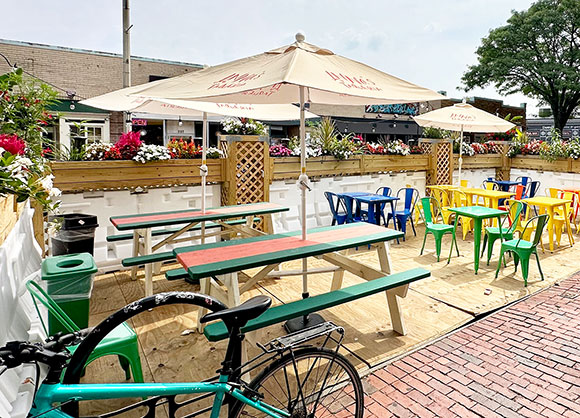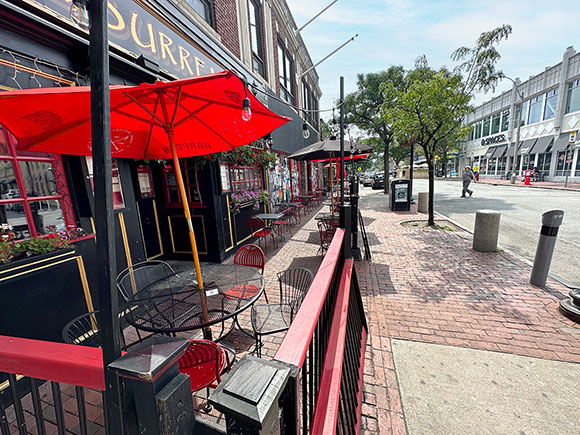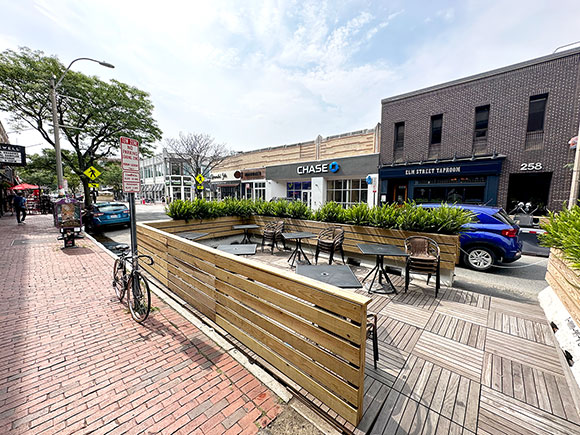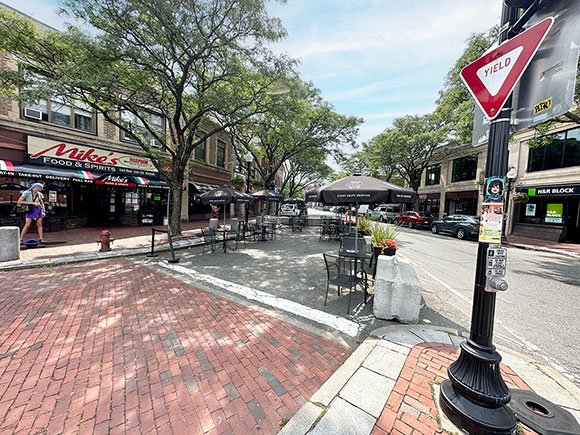
One of the reasons that the city is establishing new outdoor dining fees for restaurants is to account for the revenue lost by blocked parking meters. — Photos by Maile Blume
By Maile Blume
After three years of encouraging outdoor dining in response to the pandemic, the city is establishing new fees for businesses with outdoor seating areas.
The city did not charge any fees for outdoor dining from 2020 to 2022. However, in 2023, restaurants with outdoor seating on city property were required to hold outdoor dining licenses.
The fees associated with these licenses only covered the administrative costs of the licensing process itself, said Director of Economic Development for Somerville Rachel Nadkarni during a public meeting on the new fee structure. She said that the goal of introducing additional fees for outdoor seating in 2024 is to account for the costs of outdoor dining to the city.
Nadkarni encouraged attendees at the meeting to provide feedback to help shape the new fee structure, adding that the city is working to ensure that the new fees are fair for everyone. “We want to see more outdoor seating in the years to come,” she said.

The city is considering if the outdoor dining fees will be applied per square footage or per seat, and is taking into account the seasonal nature of outdoor dining.
Costs to the city
Outdoor dining limits the city in several ways, said Nadkarni, the most costly being that it turns metered parking spaces into seating areas, eliminating the revenue that would otherwise be generated from these spaces. Outdoor seating also keeps public spaces from being used in other ways by the Somerville community, and prevents the city from upgrading sidewalks and roads.
Nadkarni asked attendees to consider how fees could respond to the diverse economic circumstances surrounding different local businesses, if fees should be applied per seat or per square footage, and how fees could be priced to continue to encourage outdoor dining.
While the city is looking at the fee structures of neighboring cities, Somerville has not yet come up with exact numbers for the fees that will be implemented in 2024. Nadkarni addressed the attendees, “To figure out how that translates into numbers, we need feedback from you.”

Concerns of business owners
Attendees at the public meeting raised several questions about the new regulations. Business owner Sergio Espinoza asked how the plumbing code for restaurants – which requires a certain number of toilets, hand washing stations, and garbage disposals per a certain number of seats – would be applied to outdoor seating, and if there would be any flexibility in these requirements.
Somerville’s Small Business Permitting Liaison Patricia Tenorio said that businesses with outdoor seating can apply to have a variance from the plumbing code, but that it is difficult for these variances to be approved at this time. “The chances are not very high,” Tenorio said.
Municipal governments throughout the Greater Boston area are currently advocating for flexibility with outdoor dining regulations – such as with the application of the plumbing code – considering the seasonal nature of outdoor dining, added Nadkarni. Union Square Main Streets Small Business Liaison Michael Robles said, “Thinking about how outdoor dining really works, realistically, past October no one is really sitting outside too much.”
In addition to addressing seasonal changes, the new fee structure could promote sustainability, Robles suggested. “You know, I would like to see something where there can be an environmental sustainability aspect of this – where if a restaurant were to use the same materials over and over, and the same resources, the fee structure could incentivize some environmentally friendly practices,” he said.

Somerville could also consider a fee structure with different tiers that take into account a restaurant’s size, location, or how much revenue they bring in, he added, saying that for “smaller businesses or those located in a less trafficked area, there could be an incentive to pay lower fees.” Robles also said that the city could consider charging different fees for “on” and “off” peak dining hours, to help offset the parking meter revenue that the city is losing.
Nadkarni responded that the city is in the process of analyzing a recent curb study to determine how the city can best work with its current parking patterns. Then, it will establish steps forward in this area.
On the topic of creating a new fee structure, small business owner Paola Ibarra Deschamps asked for the city to make these regulations “timely, clear, and constant.” She said that it can be challenging for small businesses when the city’s licensing structure changes from year to year.
Nadkarni said that the city is planning to have the new fee structure in place by Oct. 1 to allow businesses to budget accordingly, as they submit their license renewal forms for 2024.
She said that the city wants to continue to promote outdoor dining, even with the new fees in place. “The vibrancy is such a key part of why we all love outdoor dining so much — it really brings people to the squares and helps keep them exploring,” she said, adding, “When you’re sitting and having a cocktail or having dinner, you’re seeing all the other businesses around you, right? You’re living in the square, right? And it’s fantastic. So we do want to keep it going, and figure out a way that we can make these fees really work.”
Nadkarni encouraged members of the Somerville community to send any additional comments to economicdevelopment@somervillema.gov to help the city determine the new licensing fees. According to the city’s website, two more public meetings will be held on September 14, from 9:00 a.m. to 10:30 a.m. and from 6:00 p.m. to 7:30 p.m., for the Somerville community to review a proposal of the new license fee structure.

















Reader Comments